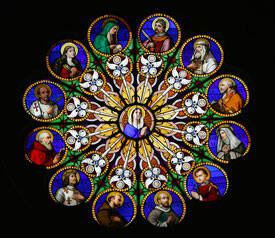Santo Non Subito
Some Catholics may have been puzzled over reports of a new document from the Vatican’s Congregation for Saints’ Causes calling for “strict adherence” to the canonization process. The instruction asked for better documentation to avoid “fraud or deception” and noted that some procedures had become “problematic.” At a press conference, Cardinal José Saraivo Martins, prefect of the congregation, stated that there had been “confusion” at the local level. But, overall, no new rules were initiated; the old ones were merely tightened. The process should, the cardinal noted, begin not with the enthusiasm of small interest groups, but from a candidate’s “stable, continuous and widespread” reputation for holiness. And investigators should not neglect negative accounts of the person’s life.
The Vatican’s cautionary instruction may have been promulgated not simply for those who work directly on these cases, but for the benefit of the faithful as well. Over the last 20 years, concern has arisen in many church quarters over whether Pope John Paul II was overzealous in his desire to canonize men and women from around the globe. During his pontificate, some 1,340 people were beatified and 500 canonized—more than all his predecessors combined since the current procedures were instituted in 1588. Rumors of laxity in the canonization process only raise doubts among Catholics over whether certain candidates truly deserve the title “saint.” Stricter procedures can only enhance devotion to the saints, ensuring Catholics that those whose intercession they invoke really are worthy of “public veneration.”
Fragile Peace in the Balkans
The riots in Belgrade in February revealed the great depth of Serbian discontent with Kosovo’s declaration of independence as well as the fragility of the peace in the Balkans. Some have argued that the West acted too quickly in recognizing Kosovo’s independence and, by taking sides in the dispute, has contributed to further destabilization of the situation. Yet the West had already taken sides, especially in 1999, when a NATO coalition drove Serbia’s troops from Kosovo, ending the genocide there.
The United States, as a party to the conflict then, has a moral responsibility now to ensure a peaceful settlement. The United States must vigorously support the European Union’s new legal and policing efforts aimed at stabilizing Kosovo and providing a smooth transition from U.N. governance. A robust Western presence in Kosovo will signal that neither reprisals against the Serbian minority in Kosovo nor a Serbian military intervention will be countenanced.
Washington must also talk to Moscow. Russia is the one government with the credibility to help Serbia’s prime minister talk the nationalists off the ledge. The Bush administration has badly bungled the U.S. relationship with Russia, but some accommodation may still be reached. In exchange for Russia’s assistance, the United States could address one of Russia’s principal concerns by making it clearer to the world that recognition of Kosovo should not be taken as approval for a stampede toward independence in other breakaway regions, particularly those within the Russian sphere of influence. The United States should also send a strong signal that an independent Kosovo is not the first step toward the greater Albania so feared by Serbia.
Most observers do not expect an all-out war. Most Serbians do not believe Kosovo is worth going to war over, according to recent public opinion polls. But the situation is volatile and the West must do everything in its power to ensure that the spark of violence struck in Belgrade does not ignite another Balkan conflagration.
The Unwilling Coalition
It appears that President Pervez Musharraf is not long for the world of Pakistani politics. His party suffered a crushing defeat in the country’s parliamentary elections in February. The leaders of Pakistan’s two main opposition parties announced shortly afterward that they would work together to form a coalition government and that the new anti-Musharraf coalition in the lower house was only 17 votes shy of the number needed to impeach him. Even if impeachment fails, the judiciary, which will likely be restored by the new Parliament, will probably rule that Musharraf’s re-election last fall was illegal and invalid, further undermining his tenuous hold on power.
Washington is panicking because the government that may replace Musharraf’s will be a coalition of the unwilling, opposed to further Pakistani participation in the U.S.-led war on terror. As inconvenient as this may be for the United States, its recent meddling in Pakistan’s parliamentary politics by trying to convince the opposition leaders to let Musharraf stay was clumsy and ill-advised. Though both Mr. Zadari and Mr. Sharif, the victors in February’s elections, have spotty records on democracy and good government, they now have a legitimate mandate to govern. If the United States means what it says about democracy, and if a peaceful, democratic and legal movement within Pakistan wants Musharraf to go, it would be hypocritical for the United States to stand in the way.








